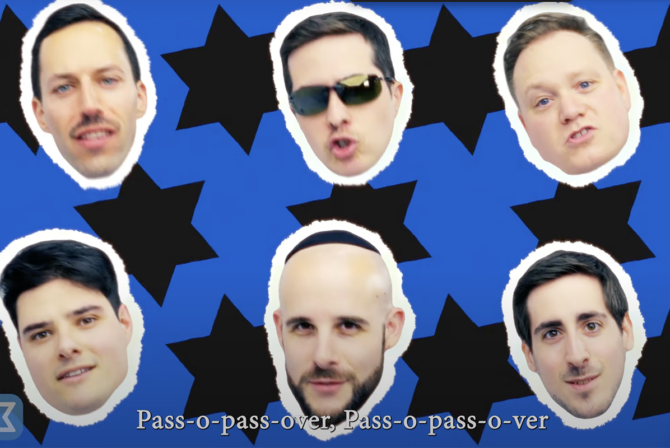At high noon on Rosh Hashanah nine years ago, I became a mother, kissing my newborn’s enormous head with wonder. It was the ultimate new beginning — a new year, a new identity, a new routine, a new life.
Shortly after noon on Rosh Hashanah three years ago, I became motherless, kissing my mom’s cold forehead, and entering a new chapter as the matriarch of my family.
Last year on Rosh Hashanah, I sat under a mulberry tree, the same place where I’d scattered my mother’s ashes just weeks before. My phone rang and I heard words that would change my life more than the birth of my son or the death of my mother: You have cancer.
Despite the immense highs and lows, I’ve always loved this time of year — crisp notebooks and crunching leaves, the end of the thick humidity that infuses my Kentucky home. Most of all, I love Rosh Hashanah, a holiday that offers a new beginning. For my family, especially, that beginning has been sometimes hopeful, sometimes challenging, but it always reminds me that reflection is as important as setting intentions.
When my son was born on Rosh Hashanah, people said it was a blessing, and I relished in that. I stared at him — his big eyes, misshapen head, and those tiny fingers with the shockingly strong grip. If there was ever a time to search one’s heart, it was the birth of my first child.
I spent those Days of Awe, well, in awe of this new life we’d created. My mom flew 4,000 miles to meet her first grandchild, and we spent the High Holidays learning how to be with each other as mother and grandmother. She cooked and slept on an air mattress on the floor of our one-bedroom flat in Scotland, taking the early shift holding the baby, who could not sleep outside of anyone’s arms.
The start of 5773 was magical. The future was exciting, despite the long nights and exhausting days. During those first few weeks of motherhood and grandmotherhood, we strapped the baby on our chests, took train rides to coastal castles and traversed ancient ruins, breathing in the sea air and making plans, so many plans. Mom flew back to Kentucky eventually, and we knew we couldn’t keep her only grandchild so far away. We made our own plans to move back to America, joyful in the knowledge that we’d raise our child close to family.
Six years later, after many long months of caring for my mom who was struggling with pancreatic cancer, I spent Rosh Hashanah listening to my mother’s death rattle. My family sat around in a fog of grief, simultaneously not wanting her to go but relieved her struggle would be over. With her last gasp for air came an overwhelming stillness.
Less than an hour after they took away her body, I was due at synagogue. I was the musician hired to perform a song for Rosh Hashanah services, and I am not one to cancel a gig.
One song I performed was Leonard Cohen’s “If It Be Your Will” — a song of reflection, resignation and peace. How I got through a Leonard Cohen song that evening, of all the tortured artists, remains a mystery. I sang, “If it be your will that I speak no more/ And my voice be still as it was before/I will speak no more I shall abide until / I am spoken for if it be your will.”
Backstage — “It’s a bima, not a stage,” my mother’s voice corrected me in my head — the rabbi tilted his head sympathetically and asked: “How is your mother, Brigid?”
I mindlessly spat out, “She died this afternoon.”
Oh, to have recorded the look of shock and embarrassment, the reply of, “Oh, I didn’t know. I’m so sorry. May her memory be a blessing.”
I apologized for making him uncomfortable. “You couldn’t have known,” I said. “I didn’t want to make a fuss. We are relieved.”
Rabbi looked at me, confused. “Why did you come?” he said. “You can go home.“
But what I needed was normalcy, not new and frightening. I needed to feel something other than deep grief, to not sit with my thoughts. So I sang to a room full of people, to proud cousins who waved cheerfully from their seats. They smiled, and I reflected: They don’t know yet.
I played my accordion and belted harmonies with the cantor. I held back a flood of tears, growing numb with each chord change, trying both to grasp and to ignore the fact that my mother was gone.
I thought the music would provide an escape, but it instead demanded contemplation. Cohen’s lyrics were of relinquishment, when here I was, feeling lost and desperate for control.
My mother had been gone two years when, on Rosh Hashanah, I got the news I had cancer — yet my instinct was to call her. I wasn’t ready to tell my husband, and certainly not my children, who were 4 and 8. They had lost two grandparents to cancer back-to-back and wouldn’t understand that my breast cancer was, thankfully, different from my parents’ rare and terminal cancers.
So I kept quiet, and we went to the neighbors’ that evening for Shabbat. As we sat around the firepit with honey cakes and New Year’s crafts, the word came of Ruth Bader Ginsberg’s death. Together we grieved that devastating news explaining to the kids the Jewish teaching that those who die just before New Year’s are considered righteous: the ones God waited until the last minute to take.
It felt wrong to burden friends with more drama, so I sipped bourbon and sat with my thoughts, forcing smiles and conversation.
I didn’t need a shofar blast to startle me into a 10-day journey of self-reflection; a cancer diagnosis accomplishes this. Still, spending those Days of Awe reflecting on my past and yearning for a future made me appreciate the High Holidays more than ever. Unlike the birth of my son that had me reveling in the future, or the death of my mother that had me yearning for the past, this diagnosis somehow straddled both, forcing me to live in the present.
The past Jewish year has been one of six surgeries, countless doctor visits and even more pills. I’m finished with treatment and desperate for that fresh start. But as I approach Rosh Hashanah, I am afraid. What will this year have in store for us?
If I’ve learned anything, it’s that time for reflection is a gift. And to appreciate the present, you must acknowledge both the past and your uncertain future. It does not have to be life or death: it must be both.
Rosh Hashanah, though meditative, is also celebratory. We reflect, but we gather. The holiday reminds me: I do not need to carry it all alone. Reaching out, not just the New Year’s task of asking forgiveness, but allowing others to help — that is what saved me throughout my trials. The kindness of friends who cooked, cleaned, and babysat helped my family withstand deaths and diagnoses.
Soon I will invite friends to my patio under the mulberry tree for Rosh Hashanah. We will share stories, memories and my mother’s kugel. The kids will make honey cakes and crafts, and we will laugh and cry and honor and vow to take care of each other. We will reflect, but we will not dwell. And at high noon, as the shadows of the old year fade, I will kiss the forehead of my 9-year-old, that sweet face with my eyes and my mother’s smile, and wish him a happy birthday.








